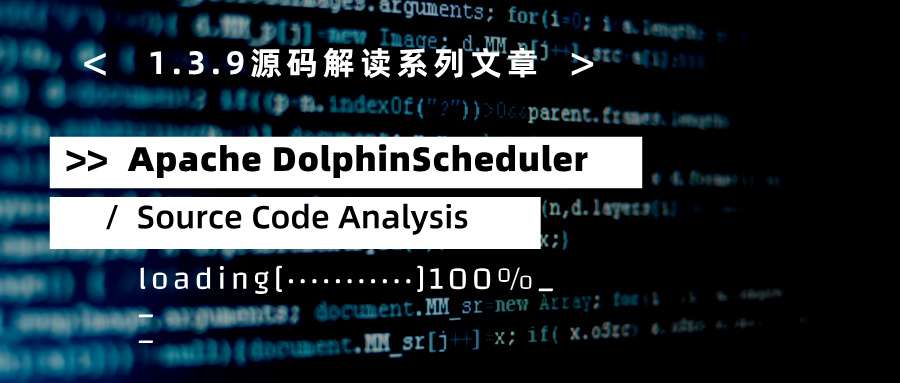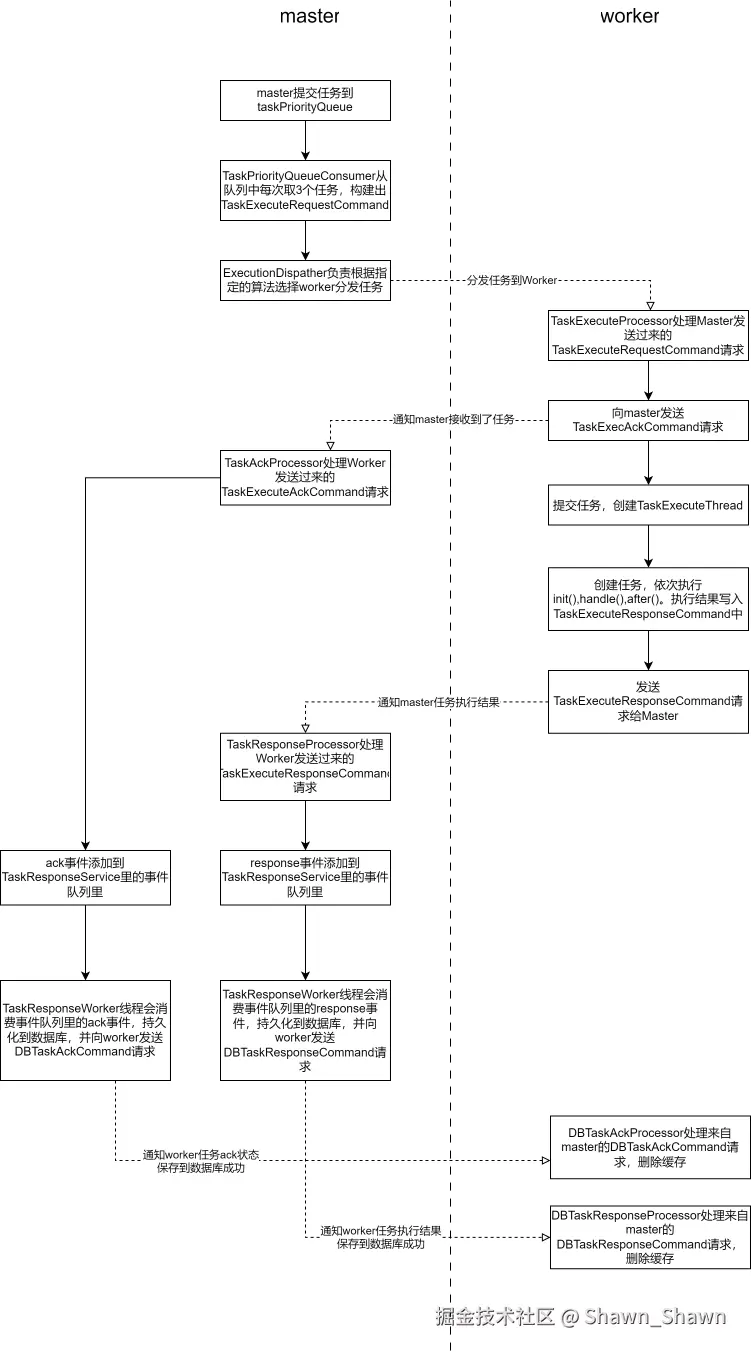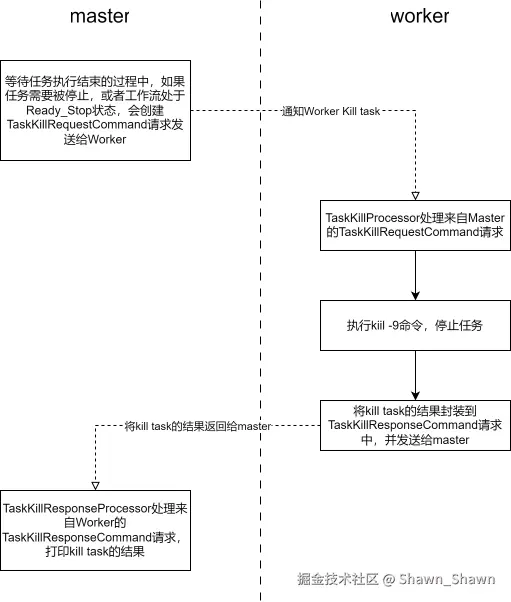引言
随着大数据的发展,任务调度系统成为了数据处理和管理中至关重要的部分。Apache DolphinScheduler 是一款优秀的开源分布式工作流调度平台,在大数据场景中得到广泛应用。

在本文中,我们将对 Apache DolphinScheduler 1.3.9 版本的源码进行深入分析,主要分析一下Master和Worker的交互设计。
感兴趣的朋友也可以回顾我们上一篇文章:Apache DolphinScheduler-1.3.9源码分析(一)
Worker配置文件
# worker listener port
worker.listen.port=1234
# worker execute thread number to limit task instances in parallel
# worker可并行的任务数限制
worker.exec.threads=100
# worker heartbeat interval, the unit is second
# worker发送心跳间隔
worker.heartbeat.interval=10
# worker max cpuload avg, only higher than the system cpu load average, worker server can be dispatched tasks. default value -1: the number of cpu cores * 2
# worker最大cpu平均负载,只有系统cpu平均负载低于该值,才能执行任务
# 默认值为-1,则最大cpu平均负载=系统cpu核数 * 2
worker.max.cpuload.avg=-1
# worker reserved memory, only lower than system available memory, worker server can be dispatched tasks. default value 0.3, the unit is G
# worker的预留内存,只有当系统可用内存大于等于该值,才能执行任务,单位为GB
# 默认0.3G
worker.reserved.memory=0.3
# default worker groups separated by comma, like 'worker.groups=default,test'
# 工作组名称,多个用,隔开
worker.groups=defaultWorkerServer启动
public void run() {
// init remoting server
NettyServerConfig serverConfig = new NettyServerConfig();
serverConfig.setListenPort(workerConfig.getListenPort());
this.nettyRemotingServer = new NettyRemotingServer(serverConfig);
this.nettyRemotingServer.registerProcessor(CommandType.TASK_EXECUTE_REQUEST, new TaskExecuteProcessor());
this.nettyRemotingServer.registerProcessor(CommandType.TASK_KILL_REQUEST, new TaskKillProcessor());
this.nettyRemotingServer.registerProcessor(CommandType.DB_TASK_ACK, new DBTaskAckProcessor());
this.nettyRemotingServer.registerProcessor(CommandType.DB_TASK_RESPONSE, new DBTaskResponseProcessor());
this.nettyRemotingServer.start();
// worker registry
try {
this.workerRegistry.registry();
this.workerRegistry.getZookeeperRegistryCenter().setStoppable(this);
Set<String> workerZkPaths = this.workerRegistry.getWorkerZkPaths();
this.workerRegistry.getZookeeperRegistryCenter().getRegisterOperator().handleDeadServer(workerZkPaths, ZKNodeType.WORKER, Constants.DELETE_ZK_OP);
} catch (Exception e) {
logger.error(e.getMessage(), e);
throw new RuntimeException(e);
}
// retry report task status
this.retryReportTaskStatusThread.start();
/**
* register hooks, which are called before the process exits
*/
Runtime.getRuntime().addShutdownHook(new Thread(() -> {
if (Stopper.isRunning()) {
close("shutdownHook");
}
}));
}注册四个Command:
- TASK_EXECUTE_REQUEST:task执行请求
- TASK_KILL_REQUEST:task停止请求
- DB_TASK_ACK:Worker接受到Master的调度请求,回应master
- DB_TASK_RESPONSE:
- 注册WorkerServer到Zookeeper,并发送心跳
- 报告Task执行状态
RetryReportTaskStatusThread
这是一个兜底机制,主要负责定时轮询向Master汇报任务的状态,直到Master回复状态的ACK,避免任务状态丢失;
每隔5分钟,检查一下responceCache中的ACK Cache和Response Cache是否为空,如果不为空则向Master发送ack_command和response command请求。
public void run() {
ResponceCache responceCache = ResponceCache.get();
while (Stopper.isRunning()){
// sleep 5 minutes
ThreadUtils.sleep(RETRY_REPORT_TASK_STATUS_INTERVAL);
try {
if (!responceCache.getAckCache().isEmpty()){
Map<Integer,Command> ackCache = responceCache.getAckCache();
for (Map.Entry<Integer, Command> entry : ackCache.entrySet()){
Integer taskInstanceId = entry.getKey();
Command ackCommand = entry.getValue();
taskCallbackService.sendAck(taskInstanceId,ackCommand);
}
}
if (!responceCache.getResponseCache().isEmpty()){
Map<Integer,Command> responseCache = responceCache.getResponseCache();
for (Map.Entry<Integer, Command> entry : responseCache.entrySet()){
Integer taskInstanceId = entry.getKey();
Command responseCommand = entry.getValue();
taskCallbackService.sendResult(taskInstanceId,responseCommand);
}
}
}catch (Exception e){
logger.warn("retry report task status error", e);
}
}
}Master与Worker的交互设计
Apache DolphinScheduler Master和Worker模块是两个独立的JVM进程,可以部署在不同的服务器上,Master与Worker的通信都是通过Netty实现RPC交互的,一共用到7种处理器。
| 模块 | 处理器 | 作用 |
|---|---|---|
| master | masterTaskResponseProcessor | 处理TaskExecuteResponseCommand消息,将消息添加到TaskResponseService的任务响应队列中 |
| master | masterTaskAckProcessor | 处理TaskExecuteAckCommand消息,将消息添加到TaskResponseService的任务响应队列中 |
| master | masterTaskKillResponseProcessor | 处理TaskKillResponseCommand消息,并在日志中打印消息内容 |
| worker | workerTaskExecuteProcessor | 处理TaskExecuteRequestCommand消息,并发送TaskExecuteAckCommand到master,提交任务执行 |
| worker | workerTaskKillProcessor | 处理TaskKillRequestCommand消息,调用kill -9 pid杀死任务对应的进程,并向master发送TaskKillResponseCommand消息 |
| worker | workerDBTaskAckProcessor | 处理DBTaskAckCommand消息,针对执行成功的任务,从ResponseCache中删除 |
| worker | workerDBTaskResponseProcessor | 处理DBTaskResponseCommand消息,针对执行成功的任务,从ResponseCache中删除 |
分发任务如何交互

master#TaskPriorityQueueConsumer
Master任务里有一个TaskPriorityQueueConsumer,会从TaskPriorityQueue里每次取3个Task分发给Worker执行,这里会创建TaskExecuteRequestCommand。
TaskPriorityQueueConsumer#run()
@Override
public void run() {
List<TaskPriority> failedDispatchTasks = new ArrayList<>();
while (Stopper.isRunning()){
try {
// 每一批次分发任务数量,master.dispatch.task.num = 3
int fetchTaskNum = masterConfig.getMasterDispatchTaskNumber();
failedDispatchTasks.clear();
for(int i = 0; i < fetchTaskNum; i++){
if(taskPriorityQueue.size() <= 0){
Thread.sleep(Constants.SLEEP_TIME_MILLIS);
continue;
}
// if not task , blocking here
// 从队列里面获取task
TaskPriority taskPriority = taskPriorityQueue.take();
// 分发给worker执行
boolean dispatchResult = dispatch(taskPriority);
if(!dispatchResult){
failedDispatchTasks.add(taskPriority);
}
}
if (!failedDispatchTasks.isEmpty()) {
// 分发失败的任务,需要重新加入队列中,等待重新分发
for (TaskPriority dispatchFailedTask : failedDispatchTasks) {
taskPriorityQueue.put(dispatchFailedTask);
}
// If there are tasks in a cycle that cannot find the worker group,
// sleep for 1 second
if (taskPriorityQueue.size() <= failedDispatchTasks.size()) {
TimeUnit.MILLISECONDS.sleep(Constants.SLEEP_TIME_MILLIS);
}
}
}catch (Exception e){
logger.error("dispatcher task error",e);
}
}
}dispatcher
/**
* dispatch task
*
* @param taskPriority taskPriority
* @return result
*/
protected boolean dispatch(TaskPriority taskPriority) {
boolean result = false;
try {
int taskInstanceId = taskPriority.getTaskId();
TaskExecutionContext context = getTaskExecutionContext(taskInstanceId);
// 这里创建TaskExecuteRequestCommand
ExecutionContext executionContext = new ExecutionContext(context.toCommand(), ExecutorType.WORKER, context.getWorkerGroup());
if (taskInstanceIsFinalState(taskInstanceId)){
// when task finish, ignore this task, there is no need to dispatch anymore
return true;
}else{
// 分发任务
// 分发算法支持:低负载优先算法,随机算法, 轮询算法。
result = dispatcher.dispatch(executionContext);
}
} catch (ExecuteException e) {
logger.error("dispatch error: {}",e.getMessage());
}
return result;
}TaskExecutionContext
// 摘录自org.apache.dolphinscheduler.server.entity.TaskExecutionContext#toCommand
public Command toCommand(){
TaskExecuteRequestCommand requestCommand = new TaskExecuteRequestCommand();
requestCommand.setTaskExecutionContext(FastJsonSerializer.serializeToString(this));
return requestCommand.convert2Command();
}分发算法实现
随机算法
public class RandomSelector<T> implements Selector<T> {
private final Random random = new Random();
public T select(final Collection<T> source) {
if (source == null || source.size() == 0) {
throw new IllegalArgumentException("Empty source.");
}
if (source.size() == 1) {
return (T) source.toArray()[0];
}
int size = source.size();
int randomIndex = random.nextInt(size);
return (T) source.toArray()[randomIndex];
}
}轮询算法
public class RoundRobinSelector<T> implements Selector<T> {
private final AtomicInteger index = new AtomicInteger(0);
public T select(Collection<T> source) {
if (source == null || source.size() == 0) {
throw new IllegalArgumentException("Empty source.");
}
if (source.size() == 1) {
return (T)source.toArray()[0];
}
int size = source.size();
return (T) source.toArray()[index.getAndIncrement() % size];
}
}低负载优先算法
public class LowerWeightRoundRobin implements Selector<HostWeight>{
public HostWeight select(Collection<HostWeight> sources){
int totalWeight = 0;
int lowWeight = 0;
HostWeight lowerNode = null;
for (HostWeight hostWeight : sources) {
totalWeight += hostWeight.getWeight();
hostWeight.setCurrentWeight(hostWeight.getCurrentWeight() + hostWeight.getWeight());
if (lowerNode == null || lowWeight > hostWeight.getCurrentWeight() ) {
lowerNode = hostWeight;
lowWeight = hostWeight.getCurrentWeight();
}
}
lowerNode.setCurrentWeight(lowerNode.getCurrentWeight() + totalWeight);
return lowerNode;
}
}TaskExecuteRequestCommand
TaskExecuteProcessor
构造方法
public TaskExecuteProcessor() {
this.taskCallbackService = SpringApplicationContext.getBean(TaskCallbackService.class);
this.workerConfig = SpringApplicationContext.getBean(WorkerConfig.class);
// worker.exec.threads,默认100
this.workerExecService = ThreadUtils.newDaemonFixedThreadExecutor("Worker-Execute-Thread", workerConfig.getWorkerExecThreads());
this.taskExecutionContextCacheManager = SpringApplicationContext.getBean(TaskExecutionContextCacheManagerImpl.class);
}process()方法
public void process(Channel channel, Command command) {
Preconditions.checkArgument(CommandType.TASK_EXECUTE_REQUEST == command.getType(),
String.format("invalid command type : %s", command.getType()));
// 序列化TaskExecuteRequestCommand
TaskExecuteRequestCommand taskRequestCommand = FastJsonSerializer.deserialize(
command.getBody(), TaskExecuteRequestCommand.class);
logger.info("received command : {}", taskRequestCommand);
if (taskRequestCommand == null) {
logger.error("task execute request command is null");
return;
}
String contextJson = taskRequestCommand.getTaskExecutionContext();
TaskExecutionContext taskExecutionContext = JSONObject.parseObject(contextJson, TaskExecutionContext.class);
if (taskExecutionContext == null) {
logger.error("task execution context is null");
return;
}
// 存入taskExecutionContextCacheManager
setTaskCache(taskExecutionContext);
// 创建任务日志
Logger taskLogger = LoggerFactory.getLogger(LoggerUtils.buildTaskId(LoggerUtils.TASK_LOGGER_INFO_PREFIX,
taskExecutionContext.getProcessDefineId(),
taskExecutionContext.getProcessInstanceId(),
taskExecutionContext.getTaskInstanceId()));
taskExecutionContext.setHost(NetUtils.getAddr(workerConfig.getListenPort()));
taskExecutionContext.setStartTime(new Date());
taskExecutionContext.setLogPath(getTaskLogPath(taskExecutionContext));
// local execute path
String execLocalPath = getExecLocalPath(taskExecutionContext);
logger.info("task instance local execute path : {}", execLocalPath);
taskExecutionContext.setExecutePath(execLocalPath);
// ThreadLocal存储任务日志
FileUtils.taskLoggerThreadLocal.set(taskLogger);
try {
// 创建执行
FileUtils.createWorkDirAndUserIfAbsent(execLocalPath, taskExecutionContext.getTenantCode());
} catch (Throwable ex) {
String errorLog = String.format("create execLocalPath : %s", execLocalPath);
LoggerUtils.logError(Optional.ofNullable(logger), errorLog, ex);
LoggerUtils.logError(Optional.ofNullable(taskLogger), errorLog, ex);
taskExecutionContextCacheManager.removeByTaskInstanceId(taskExecutionContext.getTaskInstanceId());
}
FileUtils.taskLoggerThreadLocal.remove();
taskCallbackService.addRemoteChannel(taskExecutionContext.getTaskInstanceId(),
new NettyRemoteChannel(channel, command.getOpaque()));
// 向master发送TaskExecuteAckCommand
this.doAck(taskExecutionContext);
// submit task
workerExecService.submit(new TaskExecuteThread(taskExecutionContext, taskCallbackService, taskLogger));
}
private void doAck(TaskExecutionContext taskExecutionContext){
// tell master that task is in executing
TaskExecuteAckCommand ackCommand = buildAckCommand(taskExecutionContext);
ResponceCache.get().cache(taskExecutionContext.getTaskInstanceId(),ackCommand.convert2Command(),Event.ACK);
taskCallbackService.sendAck(taskExecutionContext.getTaskInstanceId(), ackCommand.convert2Command());
}TaskExecuteThread
构造方法
public TaskExecuteThread(TaskExecutionContext taskExecutionContext
, TaskCallbackService taskCallbackService
, Logger taskLogger) {
this.taskExecutionContext = taskExecutionContext;
this.taskCallbackService = taskCallbackService;
this.taskExecutionContextCacheManager = SpringApplicationContext.getBean(TaskExecutionContextCacheManagerImpl.class);
this.taskLogger = taskLogger;
}运行方法
public void run() {
TaskExecuteResponseCommand responseCommand = new TaskExecuteResponseCommand(taskExecutionContext.getTaskInstanceId());
try {
logger.info("script path : {}", taskExecutionContext.getExecutePath());
// task node
TaskNode taskNode = JSONObject.parseObject(taskExecutionContext.getTaskJson(), TaskNode.class);
// copy hdfs/minio file to local
// 下载需要的资源,例如Spark/Flink jar,udf等
downloadResource(taskExecutionContext.getExecutePath(),
taskExecutionContext.getResources(),
logger);
taskExecutionContext.setTaskParams(taskNode.getParams());
taskExecutionContext.setEnvFile(CommonUtils.getSystemEnvPath());
taskExecutionContext.setDefinedParams(getGlobalParamsMap());
// set task timeout
setTaskTimeout(taskExecutionContext, taskNode);
taskExecutionContext.setTaskAppId(String.format("%s_%s_%s",
taskExecutionContext.getProcessDefineId(),
taskExecutionContext.getProcessInstanceId(),
taskExecutionContext.getTaskInstanceId()));
// 创建任务
task = TaskManager.newTask(taskExecutionContext, taskLogger);
// 初始化任务
task.init();
// 构建任务所需要的参数
preBuildBusinessParams();
// 执行任务
task.handle();
// 任务执行完成后的动作
task.after();
responseCommand.setStatus(task.getExitStatus().getCode());
responseCommand.setEndTime(new Date());
responseCommand.setProcessId(task.getProcessId());
responseCommand.setAppIds(task.getAppIds());
logger.info("task instance id : {},task final status : {}", taskExecutionContext.getTaskInstanceId(), task.getExitStatus());
} catch (Exception e) {
logger.error("task scheduler failure", e);
// 如果出现异常,kill task
kill();
responseCommand.setStatus(ExecutionStatus.FAILURE.getCode());
responseCommand.setEndTime(new Date());
responseCommand.setProcessId(task.getProcessId());
responseCommand.setAppIds(task.getAppIds());
} finally {
// 从cache中去除任务执行上下文。
taskExecutionContextCacheManager.removeByTaskInstanceId(taskExecutionContext.getTaskInstanceId());
// 缓存responseCommand
ResponceCache.get().cache(taskExecutionContext.getTaskInstanceId(), responseCommand.convert2Command(), Event.RESULT);
// 向master发送ResponseCommand
taskCallbackService.sendResult(taskExecutionContext.getTaskInstanceId(), responseCommand.convert2Command());
// 清除task执行路径
clearTaskExecPath();
}
}master#TaskResponseService
Worker在正常执行分发任务的时候,会向Master发送ACK Command 和 Response Command。
在Master中,则由TaskAckProcessor和TaskResponseProcessor进行处理。
TaskAckProcessor
public void process(Channel channel, Command command) {
Preconditions.checkArgument(CommandType.TASK_EXECUTE_ACK == command.getType(), String.format("invalid command type : %s", command.getType()));
TaskExecuteAckCommand taskAckCommand = FastJsonSerializer.deserialize(command.getBody(), TaskExecuteAckCommand.class);
logger.info("taskAckCommand : {}", taskAckCommand);
// 添加缓存
taskInstanceCacheManager.cacheTaskInstance(taskAckCommand);
String workerAddress = ChannelUtils.toAddress(channel).getAddress();
ExecutionStatus ackStatus = ExecutionStatus.of(taskAckCommand.getStatus());
// TaskResponseEvent
TaskResponseEvent taskResponseEvent = TaskResponseEvent.newAck(ackStatus,
taskAckCommand.getStartTime(),
workerAddress,
taskAckCommand.getExecutePath(),
taskAckCommand.getLogPath(),
taskAckCommand.getTaskInstanceId(),
channel);
// 主要处理逻辑
taskResponseService.addResponse(taskResponseEvent);
}TaskResponseProcessor
public void process(Channel channel, Command command) {
Preconditions.checkArgument(CommandType.TASK_EXECUTE_RESPONSE == command.getType(), String.format("invalid command type : %s", command.getType()));
TaskExecuteResponseCommand responseCommand = FastJsonSerializer.deserialize(command.getBody(), TaskExecuteResponseCommand.class);
logger.info("received command : {}", responseCommand);
// 缓存
taskInstanceCacheManager.cacheTaskInstance(responseCommand);
// TaskResponseEvent
TaskResponseEvent taskResponseEvent = TaskResponseEvent.newResult(ExecutionStatus.of(responseCommand.getStatus()),
responseCommand.getEndTime(),
responseCommand.getProcessId(),
responseCommand.getAppIds(),
responseCommand.getTaskInstanceId(),
channel);
// 主要处理逻辑
taskResponseService.addResponse(taskResponseEvent);
}TaskResponseService
通过TaskResponseProcessor和TaskAckProcessor发现,其主要逻辑都在TaskResponseService类中,而TaskResponseService中处理事件,是通过TaskResponseWorker线程实现的。
// TaskResponseEvent队列是阻塞队列
private final BlockingQueue<TaskResponseEvent> eventQueue = new LinkedBlockingQueue<>(5000);
class TaskResponseWorker extends Thread {
@Override
public void run() {
while (Stopper.isRunning()){
try {
// 如果没有任务事件,则会阻塞在这里
TaskResponseEvent taskResponseEvent = eventQueue.take();
// 任务实例状态持久化到数据库
persist(taskResponseEvent);
} catch (InterruptedException e){
break;
} catch (Exception e){
logger.error("persist task error",e);
}
}
logger.info("TaskResponseWorker stopped");
}
}
/**
* persist taskResponseEvent
* @param taskResponseEvent taskResponseEvent
*/
private void persist(TaskResponseEvent taskResponseEvent){
Event event = taskResponseEvent.getEvent();
Channel channel = taskResponseEvent.getChannel();
switch (event){
case ACK:
try {
TaskInstance taskInstance = processService.findTaskInstanceById(taskResponseEvent.getTaskInstanceId());
if (taskInstance != null) {
ExecutionStatus status = taskInstance.getState().typeIsFinished() ? taskInstance.getState() : taskResponseEvent.getState();
processService.changeTaskState(status,
taskResponseEvent.getStartTime(),
taskResponseEvent.getWorkerAddress(),
taskResponseEvent.getExecutePath(),
taskResponseEvent.getLogPath(),
taskResponseEvent.getTaskInstanceId());
}
// 向worker发送DB_TASK_ACK请求
DBTaskAckCommand taskAckCommand = new DBTaskAckCommand(ExecutionStatus.SUCCESS.getCode(), taskResponseEvent.getTaskInstanceId());
channel.writeAndFlush(taskAckCommand.convert2Command());
}catch (Exception e){
logger.error("worker ack master error",e);
DBTaskAckCommand taskAckCommand = new DBTaskAckCommand(ExecutionStatus.FAILURE.getCode(),-1);
channel.writeAndFlush(taskAckCommand.convert2Command());
}
break;
case RESULT:
try {
TaskInstance taskInstance = processService.findTaskInstanceById(taskResponseEvent.getTaskInstanceId());
if (taskInstance != null){
processService.changeTaskState(taskResponseEvent.getState(),
taskResponseEvent.getEndTime(),
taskResponseEvent.getProcessId(),
taskResponseEvent.getAppIds(),
taskResponseEvent.getTaskInstanceId());
}
// 向worker发送DB_TASK_RESPONSE请求
DBTaskResponseCommand taskResponseCommand = new DBTaskResponseCommand(ExecutionStatus.SUCCESS.getCode(),taskResponseEvent.getTaskInstanceId());
channel.writeAndFlush(taskResponseCommand.convert2Command());
}catch (Exception e){
logger.error("worker response master error",e);
DBTaskResponseCommand taskResponseCommand = new DBTaskResponseCommand(ExecutionStatus.FAILURE.getCode(),-1);
channel.writeAndFlush(taskResponseCommand.convert2Command());
}
break;
default:
throw new IllegalArgumentException("invalid event type : " + event);
}
}Worker#DBTaskAckProcessor和DBTaskResponseProcessor
Worker接受到Master的db_task_ack command和db_task_response command,对应的处理器为DBTaskAckProcessor和DBTaskResponseProcessor,其逻辑都是从ResponceCache删除对应的task instance command。
DBTaskAckProcessor
public void process(Channel channel, Command command) {
Preconditions.checkArgument(CommandType.DB_TASK_ACK == command.getType(),
String.format("invalid command type : %s", command.getType()));
DBTaskAckCommand taskAckCommand = FastJsonSerializer.deserialize(
command.getBody(), DBTaskAckCommand.class);
if (taskAckCommand == null){
return;
}
if (taskAckCommand.getStatus() == ExecutionStatus.SUCCESS.getCode()){
ResponceCache.get().removeAckCache(taskAckCommand.getTaskInstanceId());
}
}DBTaskResponseProcessor
public void process(Channel channel, Command command) {
Preconditions.checkArgument(CommandType.DB_TASK_RESPONSE == command.getType(),
String.format("invalid command type : %s", command.getType()));
DBTaskResponseCommand taskResponseCommand = FastJsonSerializer.deserialize(
command.getBody(), DBTaskResponseCommand.class);
if (taskResponseCommand == null){
return;
}
if (taskResponseCommand.getStatus() == ExecutionStatus.SUCCESS.getCode()){
ResponceCache.get().removeResponseCache(taskResponseCommand.getTaskInstanceId());
}
}停止任务如何交互

MasterTaskExecThread#waitTaskQuit
public Boolean waitTaskQuit(){
// query new state
taskInstance = processService.findTaskInstanceById(taskInstance.getId());
while (Stopper.isRunning()){
try {
// 省略代码...
// task instance add queue , waiting worker to kill
// 如果master接受到cancal请求,或者工作流状态为准备停止的状态
// master会给worker发送kill request command请求
if(this.cancel || this.processInstance.getState() == ExecutionStatus.READY_STOP){
cancelTaskInstance();
}
// 省略代码...
} catch (Exception e) {
// 省略代码...
}
}
return true;
}
private void cancelTaskInstance() throws Exception{
if(alreadyKilled){
return;
}
alreadyKilled = true;
taskInstance = processService.findTaskInstanceById(taskInstance.getId());
if(StringUtils.isBlank(taskInstance.getHost())){
taskInstance.setState(ExecutionStatus.KILL);
taskInstance.setEndTime(new Date());
processService.updateTaskInstance(taskInstance);
return;
}
// 构造TaskKillRequestCommand
TaskKillRequestCommand killCommand = new TaskKillRequestCommand();
killCommand.setTaskInstanceId(taskInstance.getId());
ExecutionContext executionContext = new ExecutionContext(killCommand.convert2Command(), ExecutorType.WORKER);
Host host = Host.of(taskInstance.getHost());
executionContext.setHost(host);
nettyExecutorManager.executeDirectly(executionContext);
logger.info("master kill taskInstance name :{} taskInstance id:{}",
taskInstance.getName(), taskInstance.getId() );
}Worker#TaskKillProcessor
TaskKillProcessor用于处理Master发送的Kill request command。
public void process(Channel channel, Command command) {
Preconditions.checkArgument(CommandType.TASK_KILL_REQUEST == command.getType(), String.format("invalid command type : %s", command.getType()));
TaskKillRequestCommand killCommand = FastJsonSerializer.deserialize(command.getBody(), TaskKillRequestCommand.class);
logger.info("received kill command : {}", killCommand);
Pair<Boolean, List<String>> result = doKill(killCommand);
taskCallbackService.addRemoteChannel(killCommand.getTaskInstanceId(),
new NettyRemoteChannel(channel, command.getOpaque()));
// 向master发送kill response command
TaskKillResponseCommand taskKillResponseCommand = buildKillTaskResponseCommand(killCommand,result);
taskCallbackService.sendResult(taskKillResponseCommand.getTaskInstanceId(), taskKillResponseCommand.convert2Command());
taskExecutionContextCacheManager.removeByTaskInstanceId(taskKillResponseCommand.getTaskInstanceId());
}
private Pair<Boolean, List<String>> doKill(TaskKillRequestCommand killCommand){
boolean processFlag = true;
List<String> appIds = Collections.emptyList();
int taskInstanceId = killCommand.getTaskInstanceId();
TaskExecutionContext taskExecutionContext = taskExecutionContextCacheManager.getByTaskInstanceId(taskInstanceId);
try {
Integer processId = taskExecutionContext.getProcessId();
if (processId.equals(0)) {
taskExecutionContextCacheManager.removeByTaskInstanceId(taskInstanceId);
logger.info("the task has not been executed and has been cancelled, task id:{}", taskInstanceId);
return Pair.of(true, appIds);
}
// 执行Kill -9 命令直接删除进程
// spark or flink如果是提交到集群,暂时Kill不掉
String pidsStr = ProcessUtils.getPidsStr(taskExecutionContext.getProcessId());
if (StringUtils.isNotEmpty(pidsStr)) {
String cmd = String.format("sudo kill -9 %s", ProcessUtils.getPidsStr(taskExecutionContext.getProcessId()));
logger.info("process id:{}, cmd:{}", taskExecutionContext.getProcessId(), cmd);
OSUtils.exeCmd(cmd);
}
} catch (Exception e) {
processFlag = false;
logger.error("kill task error", e);
}
// find log and kill yarn job
Pair<Boolean, List<String>> yarnResult = killYarnJob(Host.of(taskExecutionContext.getHost()).getIp(),
taskExecutionContext.getLogPath(),
taskExecutionContext.getExecutePath(),
taskExecutionContext.getTenantCode());
return Pair.of(processFlag && yarnResult.getLeft(), yarnResult.getRight());
}master#TaskKillResponseProcessor
TaskKillResponseProcessor用于master处理worker停止任务的响应请求。
public void process(Channel channel, Command command) {
Preconditions.checkArgument(CommandType.TASK_KILL_RESPONSE == command.getType(), String.format("invalid command type : %s", command.getType()));
TaskKillResponseCommand responseCommand = FastJsonSerializer.deserialize(command.getBody(), TaskKillResponseCommand.class);
logger.info("received task kill response command : {}", responseCommand);
}通过对 Apache DolphinScheduler 1.3.9 的源码分析,我们深入了解了其核心模块的设计和实现。
如果你对 Apache DolphinScheduler 的源码有兴趣,可以深入研究其任务调度策略的细节部分,或者根据自身业务场景进行二次开发,充分发挥 DolphinScheduler 的调度能力。
本文完!
本文由 白鲸开源科技 提供发布支持!






















 281
281

 被折叠的 条评论
为什么被折叠?
被折叠的 条评论
为什么被折叠?










